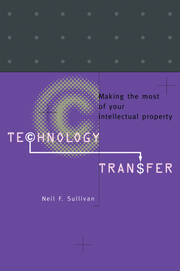Book contents
- Frontmatter
- Contents
- Prologue
- Acknowledgements
- 1 Bringing your technology to market
- 2 So do you really have something of value?
- 3 The first steps towards commercialisation of your technology
- 4 The difficult problem of valuation of intellectual property
- 5 Developing your ideas
- 6 The licensing option
- 7 Forming your own company
- 8 Financing the business start up
- 9 Make your technology a commercial success
- 10 Conclusion
- Appendices
- Index
Prologue
Published online by Cambridge University Press: 02 November 2009
- Frontmatter
- Contents
- Prologue
- Acknowledgements
- 1 Bringing your technology to market
- 2 So do you really have something of value?
- 3 The first steps towards commercialisation of your technology
- 4 The difficult problem of valuation of intellectual property
- 5 Developing your ideas
- 6 The licensing option
- 7 Forming your own company
- 8 Financing the business start up
- 9 Make your technology a commercial success
- 10 Conclusion
- Appendices
- Index
Summary
The first step in the commercialisation of your technology is one of self audit. Deciding what your ’endpoint‘ will be is crucial to the determination of the direction in which you move and the methods you take to get there. Any commercialisation will require time and effort and in the initial stages will mostly be your own. The apparently unproductive and ephemeral activities necessary to bring your technology to market will inevitably take you away from the bench and your beloved research. It is thus easy to resent the time spent in commercial exploitation, particularly if the latter is going neither well nor quickly nor if you feel out of your depth in dealing with people of a different mind set. This would perhaps be a mistake, since great satisfaction can be derived from devolving the benefits of your research. Indeed, some would see the effective transfer of research into society as a necessary and integral part of the research process.
This book is aimed at helping researchers to understand the commercial potential of their technology. It will help to bridge the communication gap and familiarise the reader with the plethora of functions, skills and processes that commercialisation requires. It will not be a substitute for the professional advice of patent agents, solicitors, marketing executives, etc., but will go some way to helping you to understand what they require.
- Type
- Chapter
- Information
- Technology TransferMaking the Most of Your Intellectual Property, pp. xi - xiiPublisher: Cambridge University PressPrint publication year: 1995



